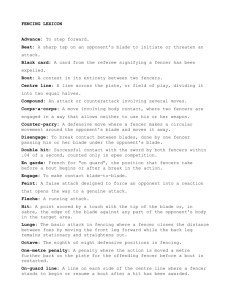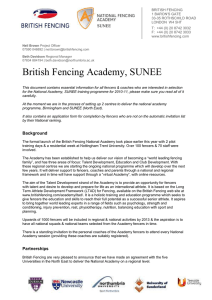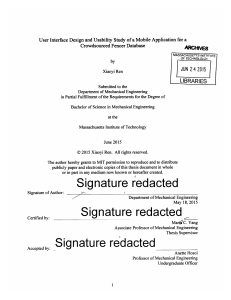Submission by UTS Fencing Club on NSWFA Selection Policy UTS
advertisement
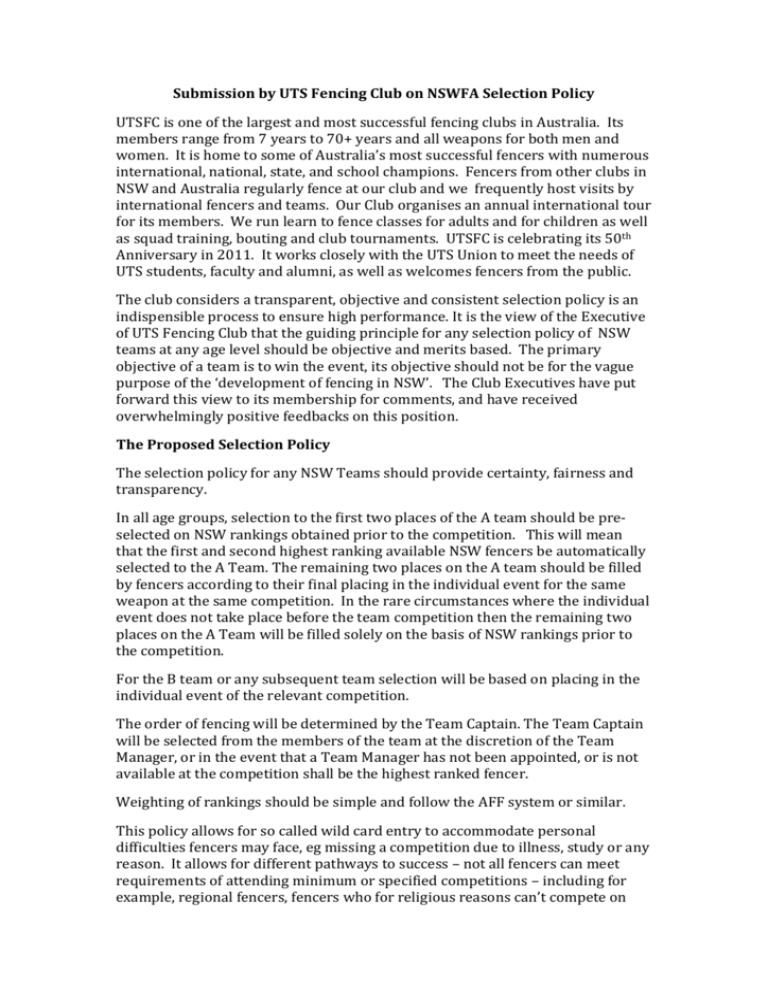
Submission by UTS Fencing Club on NSWFA Selection Policy UTSFC is one of the largest and most successful fencing clubs in Australia. Its members range from 7 years to 70+ years and all weapons for both men and women. It is home to some of Australia’s most successful fencers with numerous international, national, state, and school champions. Fencers from other clubs in NSW and Australia regularly fence at our club and we frequently host visits by international fencers and teams. Our Club organises an annual international tour for its members. We run learn to fence classes for adults and for children as well as squad training, bouting and club tournaments. UTSFC is celebrating its 50th Anniversary in 2011. It works closely with the UTS Union to meet the needs of UTS students, faculty and alumni, as well as welcomes fencers from the public. The club considers a transparent, objective and consistent selection policy is an indispensible process to ensure high performance. It is the view of the Executive of UTS Fencing Club that the guiding principle for any selection policy of NSW teams at any age level should be objective and merits based. The primary objective of a team is to win the event, its objective should not be for the vague purpose of the ‘development of fencing in NSW’. The Club Executives have put forward this view to its membership for comments, and have received overwhelmingly positive feedbacks on this position. The Proposed Selection Policy The selection policy for any NSW Teams should provide certainty, fairness and transparency. In all age groups, selection to the first two places of the A team should be preselected on NSW rankings obtained prior to the competition. This will mean that the first and second highest ranking available NSW fencers be automatically selected to the A Team. The remaining two places on the A team should be filled by fencers according to their final placing in the individual event for the same weapon at the same competition. In the rare circumstances where the individual event does not take place before the team competition then the remaining two places on the A Team will be filled solely on the basis of NSW rankings prior to the competition. For the B team or any subsequent team selection will be based on placing in the individual event of the relevant competition. The order of fencing will be determined by the Team Captain. The Team Captain will be selected from the members of the team at the discretion of the Team Manager, or in the event that a Team Manager has not been appointed, or is not available at the competition shall be the highest ranked fencer. Weighting of rankings should be simple and follow the AFF system or similar. This policy allows for so called wild card entry to accommodate personal difficulties fencers may face, eg missing a competition due to illness, study or any reason. It allows for different pathways to success – not all fencers can meet requirements of attending minimum or specified competitions – including for example, regional fencers, fencers who for religious reasons can’t compete on Sundays and a range of other circumstances – fencers can either ensure their place by participating and winning in the lead up events on which rankings are based, or they can achieve a place by fencing well in the individual event. It also precludes selection on the basis of age (other than for age specific teams) and any perceived or real conflicts of interest which arise from a subjective selection process. No coaches should be appointed to any selection panel, and on the system proposed, there is no real need for a selection panel in any case. Results from higher age categories (eg open results for selection to Under 17 team) may be used in calculating rankings for age specific selection. However, results from lower age based events may not be used in calculating rankings for higher age rankings (e.g. Under 20 results will not be taken into account in ranking for purpose of selection to open teams). Given the relatively small number of fencers in Australia, the weighting for different competitions, used by the AFF should be followed. This will address differentials in skills and competitions, without a complex formula dependent on who is in the competition. To base rankings on who is in the competition, is unfair for those who do choose to turn up – they can only fence those who are in any given competition and weighting different results based on who shows up places another barrier to those who wish to compete in the few competition that are available. AFF competitions should be included in calculating rankings as these are often larger more challenging competitions and will give a truer picture of a fencer’s capabilities. The purpose of this selection policy is to encourage all fencers, not to put up further barriers or narrow pathways which do not suit all participants. This will ensure the team is composed of the finest of available NSW fencers and all participants in the sport have an equal opportunity to aim for team selection, should they so choose. The views expressed at the meeting held on 20th February 2011, and those who have made submissions, are overwhelming in support of an objective system of selection. UTSFC supports such a system and asks that any further draft be put to a further meeting for consideration, rather than simply ratified by the NSWFA Executive, as occurred the last time selection policy was rejected by the Committee Meeting. UTSFC memberships support policies that build a strong and inclusive fencing community in the state. The club will continue to be supportive of NSWFA initiatives that work toward these goals. Secretary UTS Fencing Club
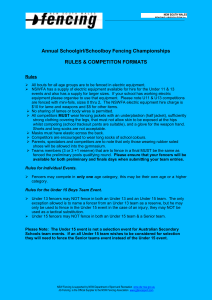
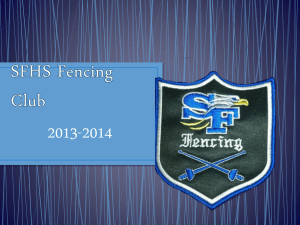
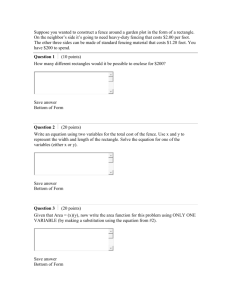
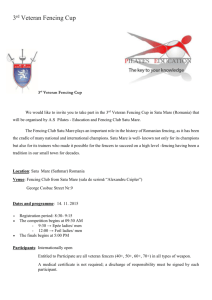
![Name of the competition [“Global Cup”]](http://s3.studylib.net/store/data/007241658_1-7c34e3454a27e94ad31ac76b2636418b-300x300.png)

